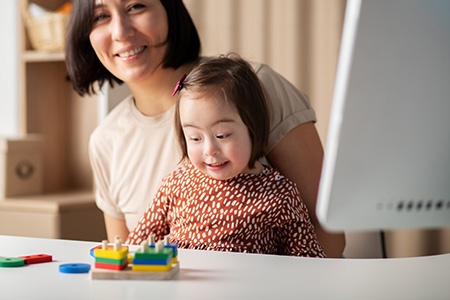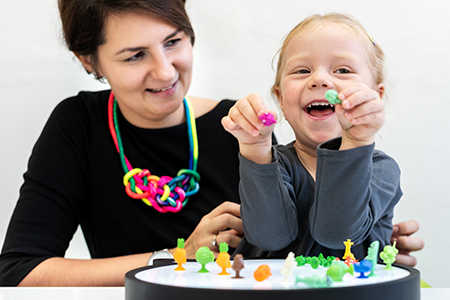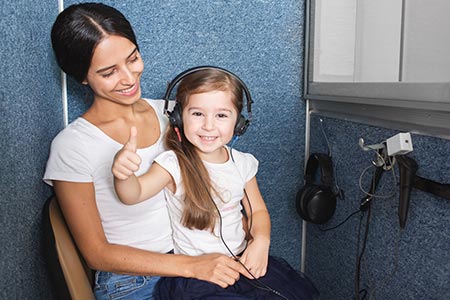
Connecting with Therapy Services
Who is able to access therapy services through CTNM?
All children (from birth to end of schooling) in Manitoba can be referred for therapy service.
Who can refer?
Family, caregivers, or professionals are all able to refer for therapy services.
How
do I get connected with therapy services?
You can call the Central Intake in your home region:

- Division scolaire franco-manitobaine (DSFM) CTNM
Educational services DSFM
Émilie Espenell- secretary
Phone: 204-878-9413
Email: Emilie.espenell@dsfm.mb.ca
DSFM Referral Form (PDF) - Interlake CTNM
Phone: 204-785-7730
Fax: 204-785-4031
Email: ctnmierhaintake@ierha.ca
Interlake Referral Form (PDF) - Northern CTNM
867 Thompson Drive
Thompson MB, R8N 1Z4
Phone: 204-677-5385
Northern Referral Form (PDF)
- Prairie Mountain CTNM
625 3rd Street SW
Dauphin, MB R7N 1R7
Phone: 204-622-2991
Fax: 204-629-3464
Email: childrenstherapy@pmh-mb.ca
Prairie Mountain Referral Form (PDF) - Promise Years CTNM
PO Box 1420
Virden MB R0M 2C0
Phone: 204-748-2692
Fax: 204-748-2436
Email: PROMISEYears@flbsd.mb.ca
PROMISE Years Referral Form (PDF) - Southern CTNM
365 Reimer Avenue
Steinbach, MB R5G 0R9
Phone: 204-346-9359
Toll free: 1-800-958-3076
Fax: 204-346-7023
Email: CTNMcentralintake@southernhealth.ca
Southern Referral Form (PDF) - Churchill-Winnipeg CTNM
SSCY Centre
1155 Notre Dame,
Winnipeg, MB R3E 3G1
Phone: 204-258-6550
Fax: 204-258-6799
Email: CTNMCentralIntake@rccinc.ca
Churchill-Winnipeg Referral Form (PDF)
- Audiology services
- Occupational therapy
- Physiotherapy
- Speech-language pathology
What does a speech-language pathologist do? + −

Speech-Language Pathologists (SLP) work together with parents/guardians, teachers and other professionals to support children to communicate successfully in a variety of situations: with family, friends, in classrooms and other community locations.
Speech-Language Pathologists look at a all parts of communication:
- Articulation/phonology: the production of sounds in words
- Language skills: understanding and using vocabulary, concepts, grammar; following directions, sequencing events
- Interaction skills: engaging in conversations and play, using communication for a variety of needs
- Stuttering: rate and smoothness of speech
- Voice: vocal quality, pitch, volume and resonance
- Augmentative and Alternative Communication: communication using pictures and gestures or technology for children who have difficulty communicating verbally
What does a physiotherapist do? + −

Physiotherapists (PT) work with children and their caregivers to help each child in reaching their maximum potential, to function independently and to promote active participation in home, school, and community environment.
Physiotherapists:
- Assess and provide recommendations to promote muscle strength, flexibility, motor development, balance, coordination and endurance
- May provide consultation in the areas of breathing, reducing pain and staying active
- Work with other team members to look at equipment that may improve a child’s ability to participate, such as a walker or modified bike.
What does an occupational therapist do? + −

A child’s life is made up of “occupations,” or daily activities that they need to do or want to do.
Occupational therapists (OT) work with children and their families to help them participate and succeed in the following areas:
- Hand skills for play and everyday tasks (e.g., holding a bottle or holding a crayon)
- Eating, dressing, sleeping, using the toilet
- Learning new play skills
- Getting ready for school (e.g., learning colors, numbers, letters)
- Paying attention (e.g., learning to listen)
- Making and playing with friends (e.g., learning to take turns; peek-a-boo)
- Learning to calm down (e.g., difficulty with transitions, tantrums)
- Understanding and managing sensory difficulties, (e.g., sensitivity to sounds, clothing or foods)
- Home and community access (e.g., bath equipment, ramps, strollers, wheelchairs)
Your Occupational therapist will work closely with you, your child and other team members as needed to make a plan to help your child be as independent as possible and reach their full potential.
What does an audiologist do? + −

Audiologists are experts who help to prevent, diagnose, and treat hearing disorders of all ages including children. Their goal is to improve the quality of life for each child and family by enhancing the ability to hear, understand, and communicate.
Audiologists:
- Supervise and conduct newborn hearing screening programs
- Diagnose and provide recommendations for hearing loss and hearing disorders in newborns, infants, children and adults
- Prescribe and fit hearing aids and other assistive listening devices
- Assess how the brain processes sounds (called auditory processing disorders)
- Work with parents/caregivers, early intervention programs, teachers of the Deaf and hard of hearing , to support the needs of children diagnosed with hearing loss
CTNM Home | Connecting with Therapy Services | How do I know I should be concerened about my child's development | Resources

